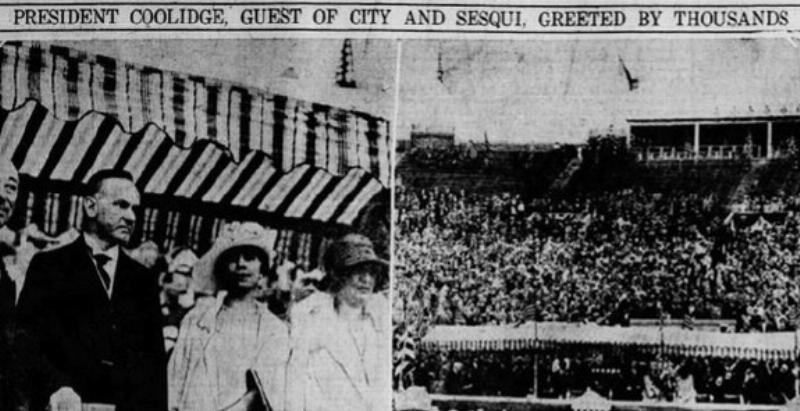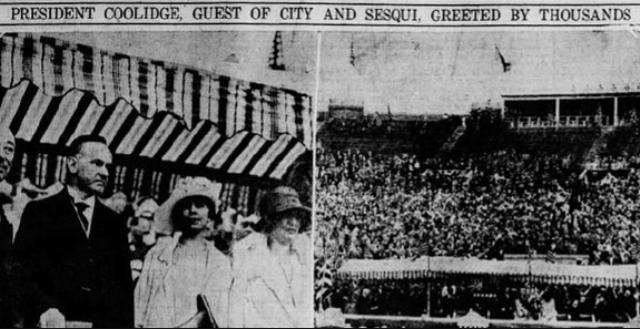


Today, July 20, is the 250th Anniversary of the First National Call to Prayer and Fasting by the Continental Congress. Newspapers and handbills throughout the colonies encouraged citizens, churches, and colonial leaders to set aside a day to appeal to the Great Governor of the Universe for His help and protection. The entire Continental Congress gathered at Christ Church in Philadelphia on this day in 1775 to pray and to hear a sermon by Rev. Jacob Duche, who would later become the first Chaplain of Congress.
Indeed, one could say that today is the official start of a year with many 250th anniversaries. Thus, this July marks the start of the 12-month countdown to celebrating America’s 250th birthday, July 4, 2026. This is the biggest 250 of them all, and we have an incredible opportunity to rekindle the flame of liberty and remember who we are and what we have done as a nation.

Calvin Coolidge celebrating the Declaration of Independence in 1926. Public domain.
Ronald Reagan gave this advice in his Farewell Address on January 11, 1989:
If we forget what we did, we won’t know who we are. I’m warning of an eradication of that—of the American memory that could result, ultimately, in an erosion of the American spirit. Let’s start with some basics: more attention to American history and a greater emphasis on civic ritual.
If we use Reagan’s words—“more attention to American history and a greater emphasis on civic ritual”—as a starting point, let’s take a look at President Calvin Coolidge’s remarks on the 150th Anniversary of the Declaration on July 4, 1926, almost a century ago.
His remarks that day are some of the most insightful words a public official has ever spoken about the Declaration. He shared his remarks before tens of thousands who had gathered in Philadelphia for the Sesquicentennial event.
He began by saying,
We meet to celebrate the birthday of America. The coming of a new life always excites our interest. Although we know in the case of the individual that it has been an infinite repetition reaching back beyond our vision, that only makes it the more wonderful.
But how our interest and wonder increase when we behold the miracle of the birth of a new nation. It is to pay our tribute of reverence and respect to those who participated in such a mighty event that we annually observe the fourth day of July.
He continued, reminding his audience that people from all over the world had come to Philadelphia to celebrate the Declaration, making the case that the principles embedded in this incredible document are eternal truths that are for all people, at all times, everywhere. There is no other charter of principles like it in the entire world and that its principles are the preeminent supports of free governments throughout the world.
Coolidge asserted that “man[kind] everywhere has an unconquerable desire to be the master of his own destiny,” which is to pursue his or her own happiness. The Declaration declares that this is an unalienable right forged in Heaven’s fire and forged into the essence of every human being by the Creator.
Buoyed up by the faith that they voiced on the July 20, 1775, National Call to Prayer and Fasting, fifty-six men put their lives (and their families’ lives) on the line to declare these truths. Once the ink was dry, the British targeted them for destruction. The 56 Signers gave it all. But those representatives were expressing the views of their respective colonies, which had come to these same convictions over time.
Coolidge explained,
The American Revolution represented the informed and mature convictions of a great mass of independent, liberty-loving, God-fearing people who knew their rights, and possessed the courage to dare to maintain them. The Continental Congress was not only composed of great men, but it represented a great people.
Embedded in this quote is the formula for national restoration; namely, the people themselves, who (1) loved liberty, (2) loved God, (3) knew their rights, and (4) had courage. In keeping with that timeless formula, for the next 12 months, we modern Americans must be active in advancing and instilling these bedrock concepts into our family, friends, churches, and community.
But President Coolidge dug even deeper. Where did these foundational principles come from?
No one can examine this record and escape the conclusion that in the great outline of its principles the Declaration was the result of the religious teachings of the preceding period... They are found in the texts, the sermons, and the writings of the early colonial clergy who were earnestly undertaking to instruct their congregations in the great mystery of how to live. They preached equality because they believed in the fatherhood of God and the brotherhood of man. They justified freedom by the text that we are all created in the divine image, all partakers of the divine spirit.
The clergy inspired the colonies with these principles for 155 years (1620-1775). “These great truths were in the air that our people breathed.”
Now to the fundamental point that Coolidge would have his audience understand. If all that he has said is true up to this point, then only one conclusion can be drawn:
In its main features the Declaration of Independence is a great spiritual document. It is a declaration not of material but of spiritual conceptions.
The elements of equality, liberty, and the rights of man are not things you can see and touch. They are ideals. They are rooted in religious convictions. They belong to an unseen world. This being the case, the church is a fundamental place for these ideas to be brought forth, examined, and talked about.
As Scott Powell has said, America needs a spiritual revival. Courageous pastors are essential.
Coolidge drove home this point with a prophetic warning.
Unless the faith of the American people in these religious convictions is to endure, the principles of our Declaration will perish. We can not continue to enjoy the result if we neglect and abandon the cause.
And then he concluded with this:
We live in an age of science and of abounding accumulation of material things. These did not create our Declaration. Our Declaration created them.
The things of the spirit come first. Unless we cling to that, all our material prosperity, overwhelming though it may appear, will turn to a barren sceptre in our grasp. If we are to maintain the great heritage which has been bequeathed to us, we must be like-minded as the fathers who created it. We must not sink into a pagan materialism. We must cultivate the reverence which they had for the things that are holy. We must follow the spiritual and moral leadership which they showed.
It has been said that:
Hard times create strong men,
Strong men create good times,
Good times create weak men,
Weak men create hard times.
Our Founders lived through hard times and were strong men. We Americans benefited from the good times they created. Now, we’re paying the price.
On this day, July 20th, the 250th anniversary of the First National Day of Prayer and Fasting, we as a nation need to wake up, return to first principles, pray, and act with courage. It is time for strong men and strong women to step up and lead. It is time for courageous pastors to fill the pulpit and teach these principles without fear. It is time for us to give of our Lives (time), our Fortunes (our money), and our Sacred Honor (reputations), so that America can Awaken again as we count down to 250!
Craig Seibert is the director of www.DeclarationOfIndependence250.org, where you will find tons of resources, including Calvin Coolidge’s Full Speech. Craig is also a Coach Mentor for www.PatriotAcademy.com, www.ServeGodDefendLiberty.com and www.ChristianCivicsTraining.org. Learn more about Rebuilding Liberty Classes Here.
